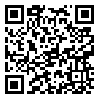Volume 2, Issue 3 (8-2020)
sjmshm 2020, 2(3): 10-16 |
Back to browse issues page
Faculty member of Payam Nour university of Tehran
Abstract: (1898 Views)
This study presented to evaluate of effect of life skills training on emotional control and mental health of teenage girls. Method of study is testing type with available samples that teenager girls (15-17 years) who were referred for Education Counseling Center of Shirvan city, 30 persons selected and divided to two groups of control and random testing. A method that used in this study is consisted of emotional control scale of Anisi (1387), which consists of a questionnaire of 42 questions that was scoring in the form of Likert scale. In both of groups were taken pre-test and then, life skills were taught with an emphasis on teenager period for 10 sessions and at the end, once again test of emotional control were taken in both of the experimental and control groups and results were assessed using by SPSS statistical analysis software and analysis of covariance. Results of study showed that teenager girls life skills training are effective in controlling their emotions.
Type of Study: Research |
Subject:
Psychiatry and Mental Health
Received: 2020/04/12 | Revised: 2020/07/15 | Accepted: 2020/07/25 | Published: 2020/08/1
Received: 2020/04/12 | Revised: 2020/07/15 | Accepted: 2020/07/25 | Published: 2020/08/1
References
1. lden, L. E., & Taylor, C. T. (2011). Relational treatment strategies increase social approach behaviors in patients with Generalized Social Anxiety Disorder. Journal of Anxiety Disorders,25(3):309-18 [DOI:10.1016/j.janxdis.2010.10.003] [PMID]
2. Alice, M. Isen(1999). Positive Affect and Decision Making, (Handbook of Emotion: chapter25)
3. Allendorf, A., & Ghimire, D. J. (2013). Determinants of marital quality in an arranged marriage society. Social ScienceResearch,42(1):59-70 [DOI:10.1016/j.ssresearch.2012.09.002] [PMID] [PMCID]
4. Argyle, M.(2001). Personality, self - esteem and demographic predictions of happiness and depression. Journal of Personality and Individual Differences, Personality and Individual Differences, 34(6: 921-942 [DOI:10.1016/S0191-8869(02)00078-8]
5. Baumeister, R. F., Campbell, J. D., Krueger, J. I., & Vohs, K. D. (2003). Does Self-esteemCause Better Performance, Interpersonal Success, Happiness, or Healthier Lifestyles? Psychol Sci Public Interest. 2003 May;4(1):1-44 Butler, Andrew & Beck, Judith. (2000). Cognitive therapy outcomes: A review of meta-analyses. Journal of the Norwegian Psychological Association. 37. 1-9. [DOI:10.1111/1529-1006.01431] [PMID]
6. Cheng, C. C. (2010). A study of inter-cultural marital conflict and satisfaction in Taiwan. International Journal of Intercultural Relations. 34(4):354-362
https://doi.org/10.1016/j.ijintrel.2010.04.005 [DOI:10.1016/j.ijintrel.2010.07.007]
7. Cloninger, C. R., & Zohar, A. H. (2011). Personality and the perception of health and happiness. Journal of Affective Disorders. 128(1-2):24-32 [DOI:10.1016/j.jad.2010.06.012]
8. Cohen, S., & Herbert, T. B. (1996). Health psychology: psychological factors and physicaldisease from the perspective of human psychoneuro immunology. Ann. Rev. psychology. 47: 113-42 [DOI:10.1146/annurev.psych.47.1.113] [PMID]
9. Dannelly, D.A. (1993); Sexually inactive marriage, Journal of Sex Research, 30(2): 171-9 [DOI:10.1080/00224499309551698]
10. Demir, A., & Fisiloglu, H. (1999). Loneliness and marital adjustment of Turkish couples. TheJournal of Psychology,133(2):230-240 [DOI:10.1080/00223989909599736]
11. James V. Cordova, Christina B. Gee, Lisa Z. Warren (2005). Emotional Skillfulness in Marriage: Intimacy As a Mediator of the Relationship Between Emotional Skillfulness and Marital Satisfaction. Journal of Social and Clinical Psychology: Vol. 24, No. 2, pp. 218-235. [DOI:10.1521/jscp.24.2.218.62270]
12. Wiebe, Stephanie & Johnson, Susan. (2016). A Review of the Research in Emotionally Focused Therapy for Couples. Family Process. 55. 10.1111/famp.12229. [DOI:10.1111/famp.12229] [PMID]
| Rights and permissions | |
 |
This work is licensed under a Creative Commons Attribution-NonCommercial 4.0 International License. |



